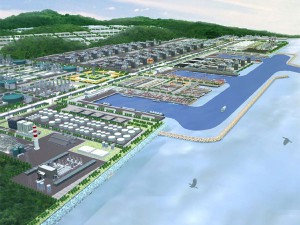The Dawei Special Economic Zone is threatening local peoples’ way of life, according to a report by the Tavoyan Women’s Union.
 The DSEZ, a joint venture of Thailand and Burma, has faced controversy since it’s inception with local and international human rights organisations expressing concerns over the project’s effect on the lives of people living in the zone.
The DSEZ, a joint venture of Thailand and Burma, has faced controversy since it’s inception with local and international human rights organisations expressing concerns over the project’s effect on the lives of people living in the zone.
According to the DSEZ website, the project will become a 50,675 acre industrial zone including a deep sea port, coal-fired power plant, highways and railroads, connecting the project to Thailand.
The Tavoyan Women’s Union report stated that people interviewed near the proposed site reported a loss of income from the project affecting farming and fishing, forcing many families to send relatives to Thailand to work, leaving them open to human trafficking and abuse.
Tens of thousand of people living in the area will also be forcibly relocated to make way for the project, the Tavoyan Women’s Union claimed, noting that surveys it conducted showed that as many as 43,000 people lived in the project’s demarcation zone.
The Tavoyan Women’s Union report found that the main cause of loss of income for farmers was land confiscation and damage to farmland. Out of 60 women interviewed, 27 reported land confiscation while only a third of these women received any compensation.
Compensation, if given, was often priced much lower than the land value. One woman was quoted in the report as receiving 500,000 kyat (US$500) an acre for her cashew nut farm, in spite of the land delivering an annual income of more than 1,00,000 kyat (US$1,000) per acre.
“The Dawei project has barely begun, but is already destroying the economic backbone of our communities. It must be stopped before it proceeds any further,” Su Su Swe, of Tavoyan Women’s Union, said, “Women are taking a stand and saying their lands and lives are not for sale by Naypyidaw.”



